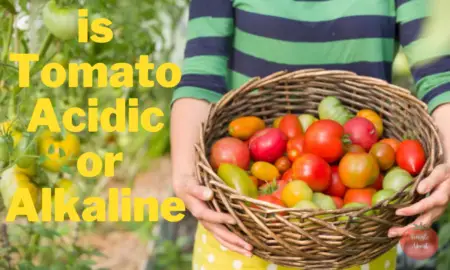Have you ever imagined what it would be like to grow a tomato that’s not only stunningly beautiful but also bursting with flavor? Meet the Cherokee Carbon tomato – a delightful marriage between two award-winning heirloom varieties that promises to elevate your culinary experiences to new heights.
As gardeners and food enthusiasts, we’re always on the lookout for varieties that can take our taste buds on a journey like no other. The Cherokee Carbon tomato does just that. Imagine biting into a juicy, meaty slice and being greeted by a symphony of rich, smoky flavors mingled with tangy undertones. It’s a taste sensation that will leave you craving more.
But before we dive into the deliciousness, let’s take a moment to appreciate the history and heritage behind this remarkable tomato.
The Origins of the Cherokee Carbon Tomato
The Cherokee Carbon tomato is the result of a harmonious union between two esteemed heirloom varieties – the Cherokee Purple and the Carbon. Both of these tomatoes have garnered accolades and admiration from gardeners and chefs alike, each boasting its own unique flavor profile.
The Cherokee Purple, dating back to the late 19th century, is a pre-1890 variety that hails from the Cherokee Native American tribe. Its deep, dusky hue and rich, sweet taste have made it a beloved choice for generations. On the other hand, the Carbon tomato, with its inky black color and smoky-sweet essence, has earned its place as a true gem among heirloom connoisseurs.
When these two remarkable varieties were carefully crossed, the resulting offspring – the Cherokee Carbon – inherited the best qualities from both parents. It’s a true celebration of diversity, blending heritage, flavor, and resilience into one extraordinary package.
Quick fact
- Color: Dark purple-pink, with shades of deep crimson
- Size: Large beefsteak tomatoes, weighing 10-12 ounces
- Shape: Oblate (slightly flattened globe)
- Taste: Rich, complex flavor profile with notes of sweetness, tanginess, and a distinct smoky undertone
- Texture: Meaty, juicy, and relatively few seeds
- Plant Type: Indeterminate vining plants, capable of growing up to 7 feet tall
- Days to Maturity: 75-80 days from transplanting
- Yield: Moderate to high, with excellent disease resistance
- Heat Tolerance: Performs well in warm climates and can withstand moderate heat
- Hardiness Zone: Best grown in zones 2-5
Pros
- incredible flavor: sweet, tangy, distinct smoky notes
- Heirloom heritage from award-winning parent varieties
- Excellent disease resistance for reliable harvests
- Meaty texture with few seeds, ideal for slicing
- Versatile for fresh eating, grilling, sauces, and more
- Stunning deep purple-pink color adds visual appeal
Cons
- Limited availability, often require sourcing from specialty suppliers
- Short shelf life, best consumed soon after harvesting
- Indeterminate vines grow very tall, need ample space and support
- Longer 75-80 day maturity requires extended growing season
- Can be challenging to find high-quality seeds
Unique characteristics of Cherokee Carbon Tomatoes
When you first lay eyes on a ripe Cherokee Carbon tomato, you can’t help but be mesmerized by its deep, rich hue. Unlike the vibrant reds and sunny yellows of many other tomato varieties, the Cherokee Carbon boasts a captivating purple-brown color that can appear almost black, giving it an air of mystery and intrigue.
But it’s not just the unique coloring that makes this tomato stand out; it’s also the incredibly complex and robust flavor. With a perfect balance of sweet and tangy notes, and a delightfully rich, smoky undertone, the Cherokee Carbon tomato delivers a taste experience that is simply unparalleled.
The Flavor and Texture of Cherokee Carbon Tomatoes
The Cherokee Carbon tomato boasts an incredibly rich, complex flavor profile that dances between sweet and tangy, with a distinct smoky undertone. As you bite into the deep purple-pink flesh, an explosion of juices bursts forth, coating your tongue with layers of tomato essence, caramelized sugars, and the subtle smokiness reminiscent of a smoldering campfire.
The texture is remarkably meaty and substantial, yet beautifully balanced. The dense, fleshy bite gives way to a velvety mouthfeel as the juices release, providing a harmonious interplay between firmness and succulence. Each mouthful is an indulgent experience, inviting you to savor the nuances of flavor that linger pleasantly on your palate.
Whether enjoyed fresh or incorporated into dishes, the Cherokee Carbon’s extraordinary flavor and texture elevate it to the ranks of a true culinary masterpiece, celebrating the diversity and beauty of heirloom varieties.
Growing Cherokee Carbon Tomato
While you may be able to find the Cherokee Carbon tomato at select farmer’s markets or specialty grocers, the true joy lies in growing it yourself. It’s an experience that will connect you to the earth and allow you to witness the magic of nature unfolding right before your eyes.
Starting Indoors
Like many tomato varieties, the Cherokee Carbon tomato benefits from being started indoors, about 6-8 weeks before the last expected frost. Use a premium seed starting kit or seed trays filled with a well-draining potting mix, and ensure that your seedlings receive ample light, either from a sunny window or a grow light.
Preventing Legginess
One common issue with indoor-started tomatoes is “legginess” – when the seedlings become tall and spindly. To combat this, ensure your seedlings receive adequate light and consider using a small oscillating fan to gently move the air around the plants, encouraging them to grow sturdier stems.
Transplanting Outdoors
Once the risk of frost has passed and the soil has warmed up, it’s time to transplant your Cherokee Carbon tomato seedlings outdoors. Choose a location that receives at least 6-8 hours of direct sunlight per day and amend the soil with compost or well-rotted manure to provide the plants with the nutrients they need.
Space your plants 18″-36″ apart in rows that are 36″-48″ apart, and be sure to water them thoroughly after transplanting. Mulching around the base of the plants with a 2-3 inch layer of organic material can help retain moisture and suppress weeds.
Staking or Caging
As the Cherokee Carbon tomato plants grow, they will need support to keep the heavy fruits off the ground and prevent breakage. You can either stake the plants individually or use sturdy tomato cages to provide the necessary support.
Harvesting and Enjoying
After about 75-80 days from transplanting, you’ll start to see the first fruits of your labor – quite literally! The Cherokee Carbon tomatoes will begin to ripen, taking on their signature dark hue and developing their rich, complex flavor.
When harvesting, be sure to handle the tomatoes gently to avoid bruising or damage. You can enjoy these tomatoes in a variety of ways – sliced and savored on their own, diced into salads, or cooked down into a flavorful sauce or salsa. Their unique taste and color will elevate any dish they grace.
How to Store Cherokee Carbon Tomatoes
Cherokee Carbon tomatoes have a relatively short shelf life due to their delicate, heirloom nature. It’s best to enjoy them fresh from the vine for optimal flavor and texture. However, here are some storage tips:
- At room temperature: Store ripe Cherokee Carbon tomatoes out of direct sunlight for 1-2 days before they start to degrade in quality.
- Refrigeration: This is not recommended as it can cause the tomatoes to become mealy and lose flavor.
- For longer storage: Consider preserving methods like canning, freezing, drying, or making tomato sauce/puree to extend their shelf life.
Cherokee Carbon Tomato Recipes ideas
Here are some delicious recipe ideas for enjoying Cherokee Carbon tomatoes:
Cherokee Carbon Tomato Caprese Salad
Slice Cherokee Carbon tomatoes and arrange on a platter with fresh mozzarella, basil leaves, and a drizzle of balsamic glaze and olive oil. The smoky undertones of the tomatoes will complement the creamy mozzarella beautifully.
Grilled Cherokee Carbon Tomato Bruschetta
Grill thick slices of Cherokee Carbon tomatoes until lightly charred. Chop and toss with garlic, basil, olive oil, and balsamic vinegar. Spoon the bruschetta mixture over toasted bread for an incredible depth of flavor.
Baked Cherokee Carbon Tomato Tart
Prepare a savory tart dough and blind bake it. Fill with a mixture of caramelized onions, fresh herbs, and shredded cheese. Top with sliced Cherokee Carbon tomatoes and bake until the tomatoes are lightly roasted.
Cherokee Carbon Tomato Gazpacho
Puree ripe Cherokee Carbon tomatoes with cucumber, red bell pepper, garlic, sherry vinegar, and a touch of smoked paprika accentuate the tomatoes’ natural smokiness. Chill and serve garnished with diced avocado.
Cherokee Carbon Tomato Jam
Slow cook diced Cherokee Carbon tomatoes with sugar, lemon juice, and spices like cinnamon and cloves until thickened into a rich, smoky tomato jam. Serve alongside cheese plates or use as a glaze for meats.
The complex flavor profile of Cherokee Carbon tomatoes lends itself beautifully to both fresh and cooked preparations, allowing you to showcase their unique sweetness, tanginess, and smoky notes in a variety of creative dishes.
Where to Find Cherokee Carbon Tomato Seeds & Plants?
As the popularity of this heirloom variety grows, Cherokee Carbon tomato seeds and plants are becoming more available, though supplies can still be limited. Great sources to check include:
- Seed Savers Exchange
- Botanical Interests
- Baker Creek Heirloom Seeds
- Territorial Seed Company
Your local nurseries and community gardens may also offer Cherokee Carbon tomato seedlings. Order seeds or inquire about plant availability early in the season for the best selection.
Conclusion
The Cherokee Carbon tomato is truly a gem among heirloom varieties, offering a unique and captivating experience for gardeners and food lovers alike. With its rich, almost black coloring, unparalleled flavor, and deep cultural significance, this tomato is a must-grow for anyone seeking to explore the world of heirloom treasures.
So, why not add the Cherokee Carbon tomato to your garden this season? Embrace its beauty, savor its flavor, and celebrate the resilience and heritage that it represents. And if you’re looking for more exceptional tomato varieties to explore, be sure to check out our website for a wealth of information and resources.

